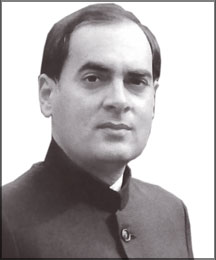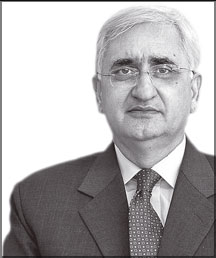|
International Relations and Security:
Understanding Regional Realities
Prof. Rajiva Wijesinha, MP
I was honoured last week to be invited to a Conference on the
‘Changing Scenario in South Asia: Leveraging Economic Growth for
Collective Prosperity’ organized by the Centre for Rural and Industrial
Development in Chandigarh. Indian think tanks have always impressed me,
and participating in discussions with the range of intellects they bring
together has always been a pleasure as well as a learning experience.
This particular Centre was not one of those that is associated with
government, like IDSA, the superb strategic analysis outfit that was
almost simultaneously hosting another dialogue of particular interest to
Sri Lanka. But CRID also attracts government attention and support, as
was apparent from the fact that the Conference was opened by the Indian
Minister for External Affairs.
|

Rajiv Gandhi |

Salman Khurshid |
This indicates the interest the Indian government has in independent
thought and analysis, and suggests the direction we too should move in.
We must begin consultation of a wider scale, and building up consensus
in the many areas in which that would be so easy, if we are to harness
all our energies to pursue the immense task of development and national
integration that we must now concentrate on.
The Conference was intended to cover a broad range of topics, and
speakers were asked to choose from a range of issues, from Economics to
Religion and Ethnicity. I thought of addressing two concerns together,
namely Security as well as Ethnicity, since it seems to me that, in the
current context, they are inextricably linked. I thought however that I
should think in terms of cooperation, since we are in great danger of
turning our backs on this, both internally and regionally. The
solipsistic mindset that seems to dominate national discourse, following
the recent vote in Geneva, needs to be overcome, if our national
interests are not to be sacrificed on the altar of big power politics.
Terrorist movements
I have always believed that, to ensure our security, we must have
good relations with India. The disasters that happened in the eighties
made it clear that, if India were hostile, no one else would come to our
rescue. And though commentators with no sense of time or causality still
attack India for encouraging terrorist movements in the early eighties,
the simple fact is that we started the distrust by trying to become
proxies of the West in the Cold War. Unfortunately the West in those
days – and perhaps now – has a polarizing view of international
relations, and demanded total loyalty, which was combined with
unremitting hostility to India, which it saw as a Soviet ally.
Hence Jayewardene’s refusal to allow India the use of the Trincomalee
oil tanks and instead his offer of them to a firm that had worrying
connotations for India, hence the effort to set up a Voice of America
station in Iranawila, hence indeed the attempt to persuade America to
have a base in Trincomalee – which I don’t think they were particularly
interested in, because the British had obligingly driven the inhabitants
of Diego Garcia from their homes so the Americans could take the place
over.
That these were India’s concerns, not support for a separate state of
Eelam, became obvious – if it was not apparent on first principles –
when they ensured that these efforts to involve Sri Lanka in the Cold
War ceased. They did this through the Annexures to the Indo-Lankan
Accord, which was clearly of more interest to them than the internal
political settlement, as was seen by their commitment to destroying the
LTTE in the war that then broke out.
Unfortunately they did not succeed, for which many Sri Lankans blame
President Premadasa and the support he gave the Tigers. But that is not
the whole story, for we must remember the internal dynamics in India,
that led to the defeat of Rajiv Gandhi’s government.
It was after all the government of V P Singh that obliged Premadasa
by withdrawing the IPKF and allowing the Tigers to rise again from the
ashes. And I am told by diplomats who were in India in the period that
followed that Rajiv Gandhi kept open his contacts with Sri Lanka, and
would probably have come to Premadasa’s assistance when he came back to
power, given that Premadasa, who was always quick to learn, had
recognized his mistake. It was this perhaps that sealed Gandhi’s fate,
not just the Tiger desire for revenge.
Foreign policy issues
What all this indicates is that, while we must ensure mutual
understanding with India, we must also be aware of their domestic
political constraints. These are not as potty as ours, because at least
the two major parties in India work together generally on foreign policy
issues, aided by a thoroughly professional diplomatic service. But, just
as we expect India to make allowance for the idiosyncratic
pronouncements of all our experts on foreign policy, so we should
realize that we must make allowance for the different interests that
contribute to policy with regard to Sri Lanka. And while we must deplore
the excesses of those who have always had a terrorist agenda, we must
realize that this does not apply to the main parties in Tamil Nadu,
which in their different ways have stood firm at crucial moments against
terrorist pressure and propaganda, at any rate after 1987.
I believe this makes sense on moral as well as intellectual grounds.
But it is also the only practical approach, for we must realize the
idiocy of making the same mistake as we made in 1987. To assume China
would come to our rescue against Indian hostility is absurd.
And in any case, Chinese foreign policy, like Indian, is not based on
polarities and exclusivity. So to promote hostility against India, as
many commentators do now, just as they did in the eighties, will
certainly not be to China’s taste. The taste of the West in the eighties
was of a different sort, but we, like the rest of the world, should
really grow up now. |





